Here's how the USA TODAY NETWORK-Wisconsin had an impact on its communities in 2022
Every day across Wisconsin, from Milwaukee to Marshfield, from Wausau to Green Bay, more than 165 journalists at the Milwaukee Journal Sentinel, Green Bay Press-Gazette, The Post-Crescent of Appleton and eight other newsrooms of USA TODAY NETWORK-Wisconsin tell the stories of people in our great state.
They set out to enlighten, to engage, to entertain and, above all, to inform.
This report focuses on the impact of our reporting in 2022 — from exposing fraud and abuse in taxpayer-financed programs aimed at reducing infant mortality, to examining failures that led to chronic health and safety problems at a nursing home for veterans.
We tested for PFAS — “forever chemicals” — in 40 water systems across the state, with alarming findings. We explored the case of Marlin Dixon and his efforts to re-integrate into society after spending more than half his life in prison. We described alarming allegations of sexual “grooming” by a Sheboygan educator awarded Teacher of the Year.
We published a heart-wrenching special report about an electrical fire, sparked by faulty wiring behind a wall, that killed three children, and a regulatory system that held their mother accountable but not the landlord, the local officials who enforce safety codes, or the state lawmakers who took power away from local governments to inspect the interiors of rental homes. “The Landlord & the Tenant” sprung from our Wires & Fires investigation last year that was named a finalist for the Pulitzer Prize Gold Medal for Public Service, along with special reports by the Washington Post and The New York Times.
These pages include many more examples of holding officials accountable. And just recently, we resurrected the Journal Sentinel's Public Investigator feature and expanded it statewide — to take tips, chase leads and expose problems large and small.
Throughout the year, our team of journalists also made progress connecting with groups we have too long ignored or taken for granted.
Our stories resulted in readers raising money for a host of causes, from helping an 11-year-old boy in Fond du Lac re-learn how to walk to helping a homeless mother in Sheboygan find stable housing. One story helped connect a son with his veteran father’s watch, lost some 50 years ago.
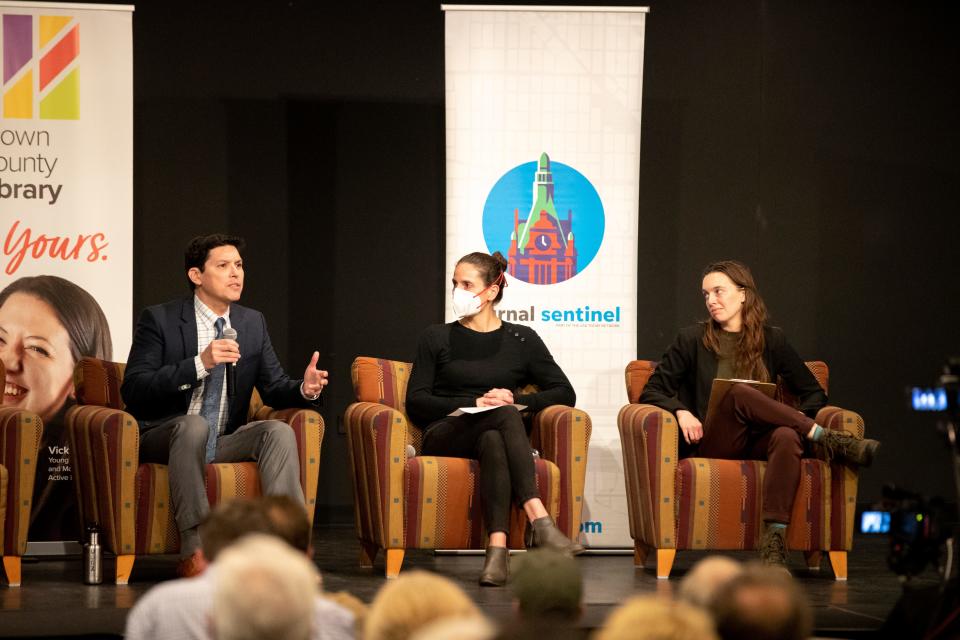
We also hosted town hall meetings and helped shape the 2022 election by giving citizens across the political spectrum a voice to tell candidates running for office what they really wanted them to address.
This report covers journalism from throughout our statewide network, anchored by the Milwaukee Journal Sentinel and including 10 sister newsrooms across Wisconsin — in Green Bay, Appleton, Wausau, Sheboygan, Manitowoc, Oshkosh, Fond du Lac, Wisconsin Rapids, Stevens Point and Marshfield.
None of this work would have had any impact if readers had not responded. None of this reporting could have been done without our subscribers.
Thank you so much for supporting our work and for giving it meaning.
Lawmakers take action following investigation into electrical fires
Milwaukee lawmakers took steps in 2022 to address the chronic problem of electrical fires in the city’s most impoverished neighborhoods. That action was in response to “Wires and Fires,” a Milwaukee Journal Sentinel investigation by Raquel Rutledge, John Diedrich and Daphne Chen that found electrical fires ravage homes in the city’s poorest ZIP code at five times the rate of the rest of Milwaukee.
Council members asked the city to analyze electrical code violations as officials considered implementing routine inspections. Wisconsin Gov. Tony Evers has called the Journal Sentinel’s findings “gut-wrenching,” and the city started an education campaign. In the spring, the series was named a Pulitzer Prize finalist for Public Service.

Journal Sentinel, ProPublica partner on ‘The Landlord & The Tenant’
In 2013, a young mother rents a house in West Allis, a suburb of Milwaukee. The previous tenant tells her, “Baby, they shouldn’t have let you move in.” What follows is a riveting narrative by Milwaukee Journal Sentinel reporter Raquel Rutledge and ProPublica’s Ken Armstrong titled “The Landlord & The Tenant.” The reporters chronicled how the lives of a struggling young mother and a notorious landlord intersected with deadly consequences. Rutledge and Armstrong, both Pulitzer Prize winners, drew upon records from 18 local, state and federal agencies and eight municipal, circuit and federal courts.
"The Landlord & The Tenant” was published simultaneously by the Journal Sentinel and ProPublica, with a special 10-page section appearing in print in the Journal Sentinel. Readers embraced the story. “A shining example why local journalism matters,” one wrote.
The response from readers to "The Landlord & the Tenant," our joint investigation with @JournalSentinel into the history and fallout of a Milwaukee house fire, has been overwhelming.
We wanted to share some of what folks have had to say. 🧵👇https://t.co/7dqNvPilS3— ProPublica (@propublica) November 20, 2022
Reporting details harassment policies, alleged sex abuse of student
Sheboygan Press reporter Maya Hilty in September revealed that anti-harassment policies required in public schools are implemented on a school-by-school basis in the 139 Lutheran Church-Missouri Synod schools in Wisconsin.
Further, Hilty wrote a story detailing allegations by a former Sheboygan Area Lutheran High School student regarding an alleged sexual relationship with one of her teachers that started in 2018. Marissa Mayer alleged music teacher Matthew Thiel continued a sexual relationship with her for more than a year after the initial assault. Hilty described the way Thiel communicated with her and the lengths she went to to inform authority figures.

The Wisconsin Department of Public Instruction opened an investigation. If the state superintendent’s office determines it is more likely than not — or there is a preponderance of evidence — that a teacher has engaged in immoral conduct, the teacher’s license will be revoked, according to DPI spokesperson Chris Bucher.
Thiel, who denies the allegations, is no longer a teacher at the school.
Deep look into unmanaged asthma reveals its devastation, and how it can be controlled
In August, Milwaukee Journal Sentinel reporter Talis Shelbourne began a series of reports on the devastating impact of asthma, which afflicts 6 million children in the United States.
The series, "Fighting for Air," found that children with uncontrolled asthma often dwell in the city’s most impoverished and under-resourced neighborhoods. Further, asthma management doesn’t happen in a vacuum. Low-income parents may need to leave work to address a child’s attack. If that time off multiplies, it can lead to less income, even lost employment. Further, children who miss school may fall behind academically or miss out on social activities. And poorly controlled asthma in youths can lead to even worse respiratory diseases in adulthood, including permanent lung damage.

Most frustrating: It can be controlled. To that end, Shelbourne wrote about how Wisconsin has stepped up its Asthma Care Program, and found that not only is it expanding its reach, but it's saving money.
The medical director of health management and community services at Children's Wisconsin told us the series of stories "garnered a great deal of interest among my colleagues here at Children’s. They were well-researched and beautifully written. " He added: "I can’t thank the Journal Sentinel enough for the outstanding series. You’ve made a difference."
Testing reveals ‘forever chemicals’ in Wisconsin drinking water
In a novel testing investigation in 2022, Milwaukee Journal Sentinel reporters Laura Schulte and Katelyn Ferral collected tap water from 40 homes across Wisconsin and sent the samples to a certified lab for testing. It found that 12 of the 40, or 30%, had levels of PFAS, also known as “forever chemicals,” over federal recommended safety limits. One sample was 450 times over.
The Journal Sentinel conducted the testing because Wisconsin has done little sampling of PFAS chemicals, which do not easily break down and can remain in the soil, water and people’s bodies. The substances are linked to an increased risk of cancer, thyroid problems and hypertension.
Open records request helps make Greenville settlement public
Former Village of Greenville supervisor Mike Woods will pay the village $74,800 to settle a 2018 lawsuit filed against him for his role in an illegal dredging and rerouting of a navigable stream five years ago. The Post-Crescent filed a public records request with the village to obtain a copy of the settlement agreement, the language of which indicates neither side wanted the settlement’s terms made public.
The unpermitted dredging at the heart of the issue started in December 2016, and was exposed in a 2017 report by The Post-Crescent. State and county regulators said the dredging drastically altered the nature of the stream and damaged a karst feature. The Wisconsin Department of Justice named Greenville, Woods and Woods’ co-defendant Robert J. Immel Excavating Inc. as the parties responsible for the damage. It ordered the restoration and imposed $90,000 in penalties for violating state waterway and wetland laws.
Combining the Immel and Woods settlements, The Post-Crescent reported, Greenville will recover just 37% of the amount it sought, leaving taxpayers on the hook for the remaining 63%, or $332,400.
Read about it here:Greenville settles lawsuit against former supervisor Mike Woods for a fraction of what it sought
Marlin Dixon series examines toll of imprisoning youths
In April, a series by Milwaukee Journal Sentinel reporter James Causey and photographer Angela Petereson gave readers a deep look into how children from traumatic, violent circumstances can quickly transform into a furious mass, forever changing lives.
The series, "Life Correction," focused on Marlin Dixon, who took part in the 2002 beating death of Charlie Young Jr. by a mob of youths. The event shook residents of the city’s most hardened neighborhoods and made national news. Dixon received the harshest sentence of the youths and corresponded with Causey while serving 18 years — more than half his life — behind bars.

Spread over three installments, the combination of compelling narrative, stunning photography, telling graphics and powerful videos gripped our readership as nothing before, reaching close to 1.5 million viewers.
A retired Milwaukee County judge, who handled the cases of some of Dixon’s cohorts, wrote: “As you know, we are back in a ‘lock ’em up’ mentality with respect to juvenile justice. Hopefully your article will have some effect on it."
Stories 'go a long way' toward transformation in how we see health care
Milwaukee Journal Sentinel reporter Guy Boulton spent a year reporting on one of the largely unspoken realities of our health system: Access to hospitals and doctors alone will not improve the overall health of people who face poverty. Housing, food, transportation, income and education can be more important to health than access to even the best physicians and hospitals.
Boulton found that across the country, hundreds of initiatives are beginning to focus on the social determinants, or drivers, of health — the conditions in which people are born, live and work. His series, "A New Prescription," offered a groundbreaking look at how other developed countries approach healthcare, and how the United States might get better results, and save money, by following their lead.
A prominent local physician wrote: "One health system alone can make a small difference, but a community-wide collaborative effort supported by business and philanthropy could be transformative. Your articles go a long way towards making transformation a reality. They influence the community (and the 'C Suite'). They validate and energize those who work with families to address barriers."
Family hails 'first in-depth' report on man's murder, disappearance
A Jan. 17, 2022, report by Duke Behnke and The Post-Crescent on the murder and disappearance of Starkie Swenson exposed lingering issues with the case and kept pressure on authorities to act.
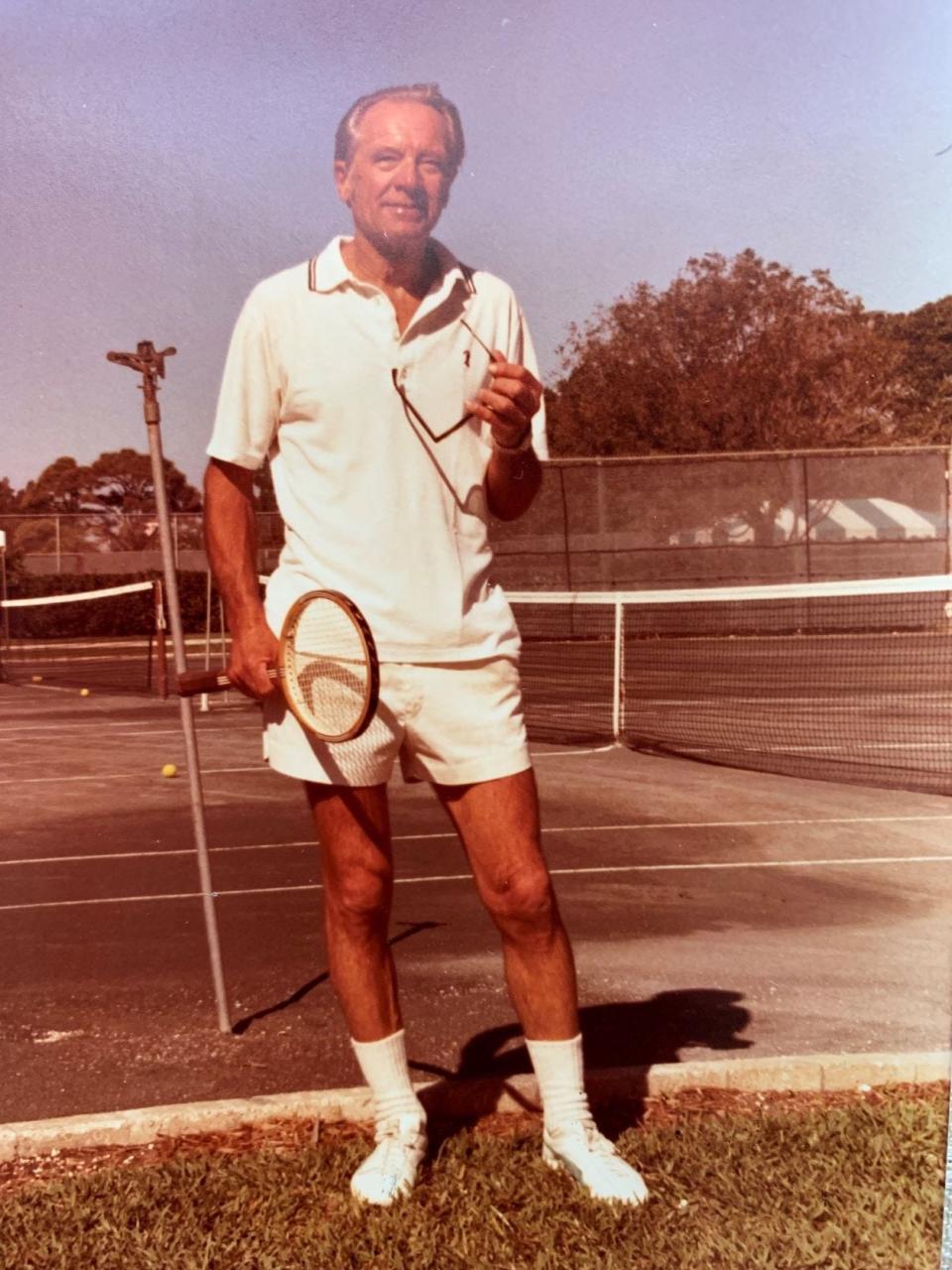
Three months later, John C. Andrews was charged with hiding a corpse. A judge eventually dismissed the charge, and the district attorney is considering an appeal.
In the wake of the reporting, Eric Tillman, a spokesman for the Swenson family, said: "My family is elated with your piece. What you compiled and how you presented it is literally the first in-depth and accurate public portrayal within 38 years of Starkie Swenson as a whole human being. Your effort to illustrate him as he truly was — beyond the one-dimensional specter of infidelity — is deeply appreciated. Thank you for sticking to the facts and for clearly stating the most pertinent questions that remain unanswered."
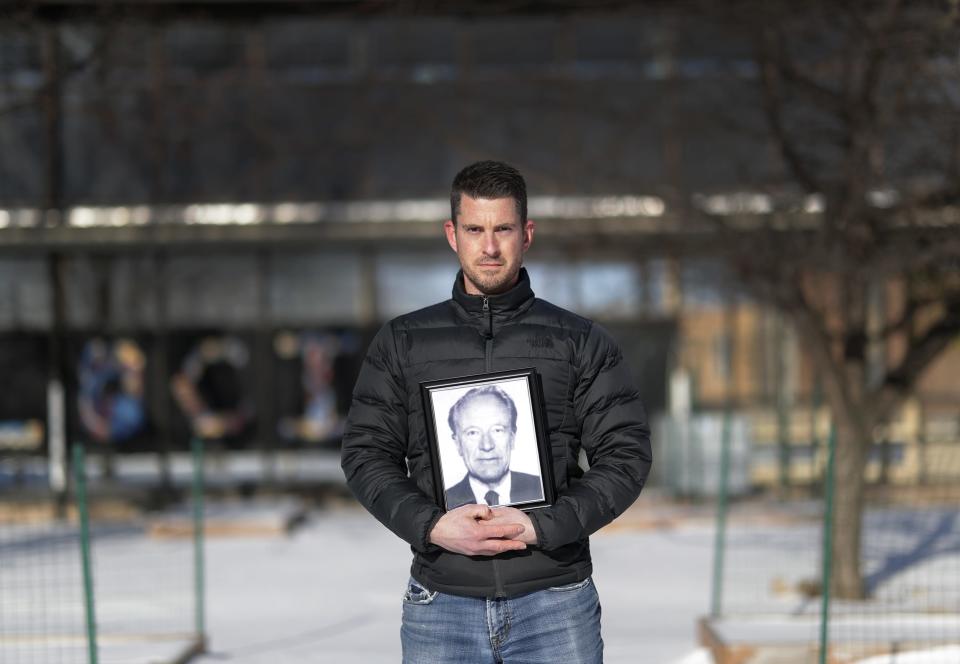
Investigation into health problems at veterans home sparks action
A Milwaukee Journal Sentinel investigation in May into chronic health and safety problems at a veterans nursing center prompted bipartisan calls for action.
The investigation, by John Diedrich and Daphne Chen, exposed how the veterans home in Union Grove has one of the most troubling records in the nation in terms of violations and fines. Among the problems: lack of water, medication errors and abuse allegations. One veteran at the home died after becoming dehydrated.
In response to the report, federal lawmakers from both political parties called for more oversight, and a state senator requested a hearing on the facility.
‘Cash Not Care’ probe of prenatal care industry prompts change
In January, the Milwaukee Journal Sentinel published “Cash Not Care,” an investigation into the prenatal care industry. The story by Cary Spivak and Mary Spicuzza documented how companies whose stated mission is helping pregnant women are increasingly suspected of fraud. The investigation uncovered financial mismanagement and revealed an industry raking in millions with little government oversight.
The story sparked immediate outrage among Milwaukee residents and elected officials. Milwaukee Ald. Michael Murphy called the misuse of taxpayer dollars “disgraceful." The city quickly adopted a plan for more oversight of the prenatal program and for a greater role for Milwaukee officials in shaping the Medicaid-funded effort. City officials lobbied for a broader state overhaul of the state’s program.
Stories raises awareness of effort to help boy re-learn how to walk
In November 2018, Mason Jerman of Fond du Lac came down with a normal cold, then was diagnosed with pneumonia MRSA at the hospital. While getting treated, complications resulted in a brain injury.
Now 11, Mason needed help learning how to walk again.
Julie Jacobs, a physical therapist at Mason’s school, found the Trexo, a robotic system that can connect to his gait trainer and assist his walking. However, the device costs more than $39,000, and since it's considered a new product, insurance companies were reluctant to cover any of it.

Jacobs reached out to local businesses, including Tammy Boudry of Boudry Dental. Boudry set up #MasonStrongDay on April 28 — with half a dozen other local businesses contributing — and alerted the Fond du Lac Reporter. Daphne Lemke wrote about Mason’s plight in April. Between then and #MasonStrongDay, the number of participating businesses doubled.
Before the event, the GoFundMe sat around $13,000. In the end, Boudry presented a check totaling $68,135 to the Jerman family on May 3. Lemke also circled back with the Jerman family in July and shared the success of the campaign, along with footage by photographer William Glasheen of Mason using his new machine.
Coverage of homeless mother’s plight leads to overflowing GoFundMe
In late January, Jelissa Burns published a story in the Sheboygan Press about Ashley Lagoo-McKinnie, a homeless mother of a 3-year-old girl who was staying at the Salvation Army in Sheboygan. Lagoo-McKinnie, who uses a wheelchair, was hoping to collect $1,400 toward housing because she had to leave the shelter during the day. After a month and a half, her GoFundMe stood at only $146.

After Burns’ story, the donations began to pour in and, less than a month later, the campaign had collected $118,000 and Lagoo-McKinnie was approved to purchase a mobile home.
"(My daughter) was excited when I told her," the young mother told Burns for a follow-up article. "She started packing her toys today." To her supporters on GoFundMe, Lagoo-McKinnie wrote: "Our lives have changed for the better and it's all because of all of you. Thank you."

Article quickly connects son with veteran father's lost watch
In November, Manitowoc Herald Times Reporter reporter Patti Zarling wrote about a Vietnam War veteran who hoped to find a Lakeshore man who left his watch behind after finishing his tour of duty at Fort Hood in Texas almost 50 years ago.

The veteran, Stephen Mendez, originally of Sheboygan, was seeking a man he thought might be named "Tony" who had served with him in the U.S. Army’s 17th Combat Engineers Battalion at Fort Hood. He remembered the man was from Manitowoc, because the crane he used was built by the Manitowoc Cranes company, and he remembered that the names "Milly," "Willy," "Dilly" and "Tilly" were painted over the wheel wells on his tan and brown Dodge truck.
That was evidently enough. Family members who read the news story identified the man as Thomas Seiler, who had recently died. Menendez mailed the Timex to Rob Seiler, Thomas’ son.
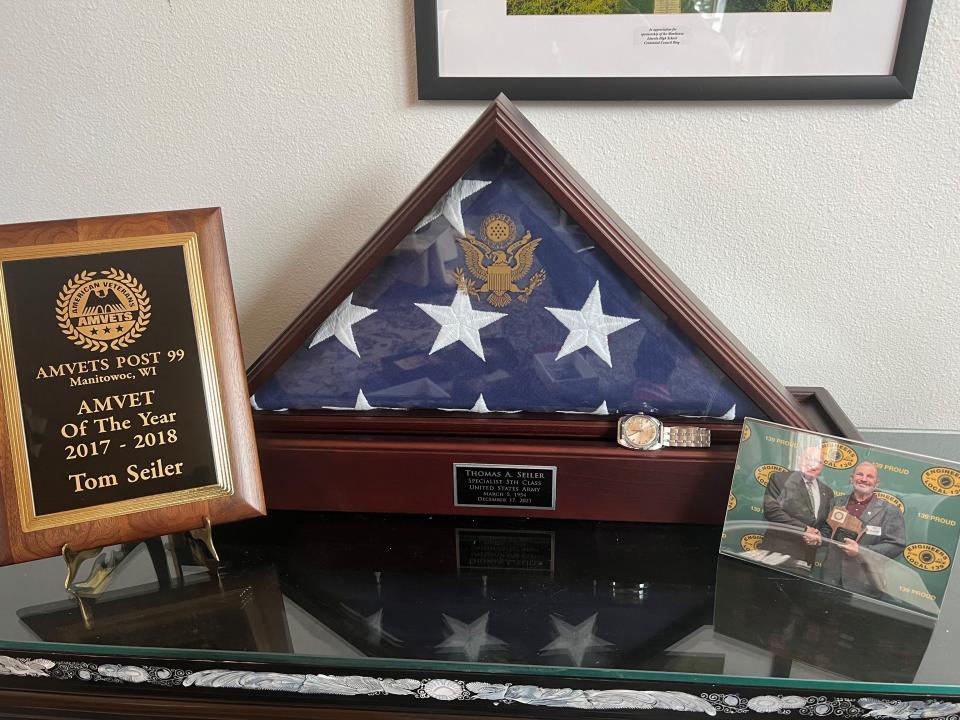
Coverage helps Afghan refugee students pay for education, find jobs
Milwaukee Journal Sentinel reporter Sophie Carson first heard that a group of women college students from Afghanistan were studying at UW-Milwaukee in an email from their English-language instructor, Brooke Haley.
They were part of a group of about 150 Afghan students from the Asian University for Women in Bangladesh who evacuated Kabul and were sent to Fort McCoy, a military base in northern Wisconsin. From there, several universities around the country agreed to accept the students.
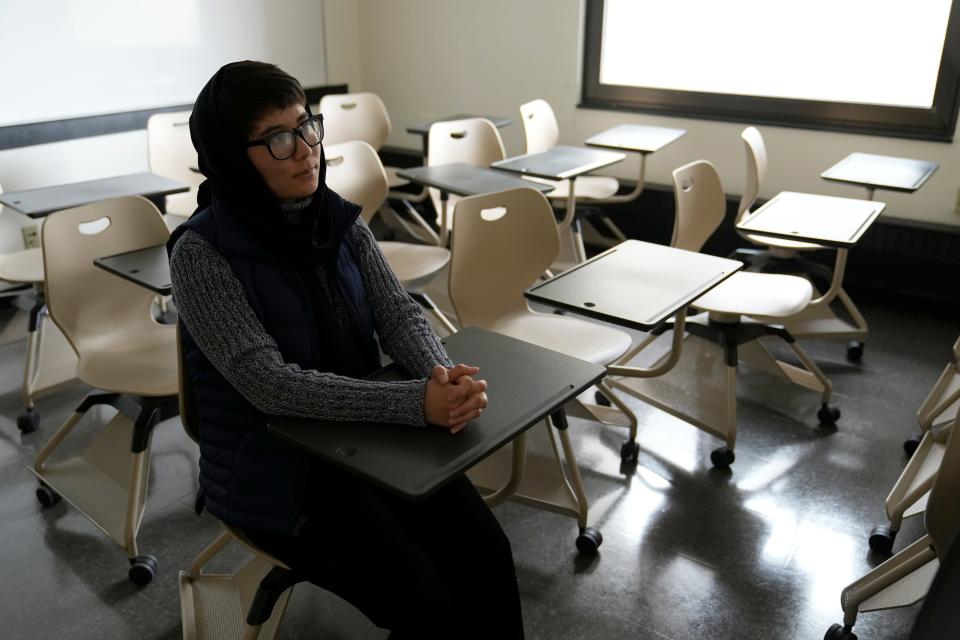
Haley was one of the drivers in getting 10 students accepted to UWM. But while the students accepted at other universities were given full rides, at UWM they were not. Haley and another English-language instructor, Mari Chevako, were tasked with fundraising their tuition. They partnered with a local nondenominational church, Eastbrook Church, and found host families for the students. The church paid the students’ tuition for the first two semesters, but future funds were uncertain.
Carson’s story, which covered the students’ journey to the U.S., and their experience adjusting to new lives, included a link to the donation portal. Readers stepped up and donated enough to fund the 2022-23 school year for all 10 women. Readers also reached out to the Journal Sentinel and to the English instructors with summer job leads, and all 10 landed summer jobs.
Providing information on expansion project helps land $50,000 grant
Oconto County Reporter's Kent Tempus in February wrote about the small, rural Lakes Country Public Library kicking off an expansion project in an effort to more than double its size and give patrons access to upgraded technology and expanded programming, including tutoring, telemedicine and a larger children's section.
Kathleen Marsh, Lakes Country Public Library Building Expansion Committee co-chair, wrote Tempus a few months later with good news.
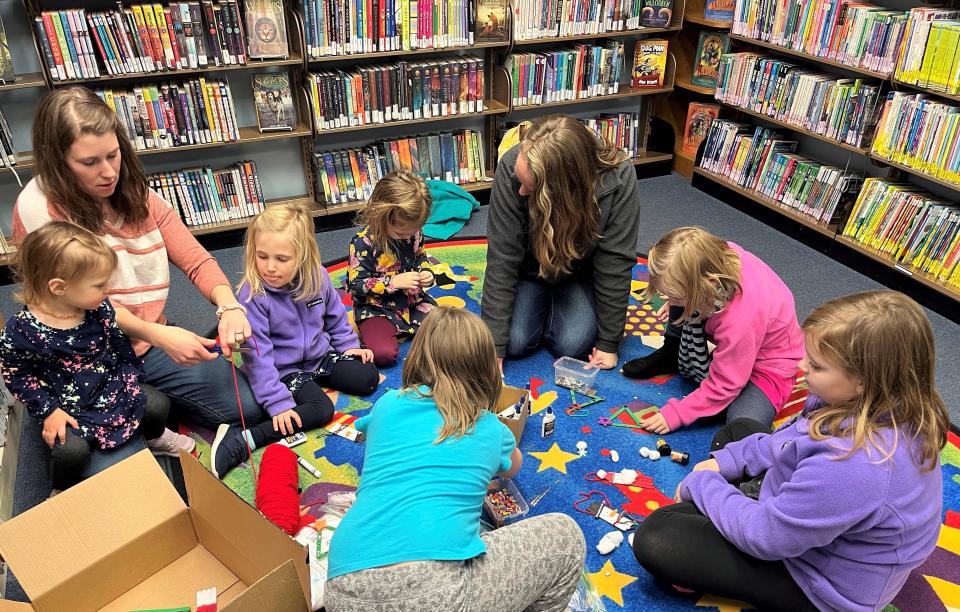
"The Director of the Bond Foundation read the article in the (Green Bay) Press-Gazette and contacted us, suggesting we apply for a grant," she wrote. "We did just that, and the library has received word that we have been awarded a $50,000 grant, renewable for four years."
The money, she said, will go a long way toward achieving the library's goal, which is in the neighborhood of $1 million.
Reporting on flag's history sparks fundraiser for arts in area schools
To call Green Bay Press-Gazette reporter Natalie Eilbert’s search for the artist behind Green Bay’s paper towel flag “impassioned” would be an understatement. The yellow flag waved over the city from 1973 to the 1990s and featured a roll of paper towels front-and-center.

Eilbert’s Christmas 2021 column detailing the search for the unknown artist is a love letter to the quirky piece of history. At its climax, the artist, Theresa Devroy, is finally identified. Devroy, who in 1973 was a junior at West High School, won a school-wide flag design contest created by Lori Ann Beirl, who was 12 at the time and had persuaded then-mayor Atkinson to hold the competition. Sadly, Devroy died at age 21 after an illness, and Beirl died within days of Eilbert’s column seeing print.
In the wake of the column, Green Bay Mayor Eric Genrich contacted one of Devroy’s surviving relatives, a sister, and got permission to print the flag on T-shirts. In August, Genrich and Green Bay Area Public School professionals presented the shirts and invited Devroy’s sister to fly in from Omaha to speak.

Proceeds from the shirt sales will support arts programming in the district. As of November, more than $5,000 had been raised — far more than the initial goal of $500. Shirts can be found at bonfire.com/gbcityflag/.
Reporter who used to teach in Ukraine returns to report on war
Earlier this year, Katelyn Ferral, a reporter on the Milwaukee Journal Sentinel’s investigative team, was the first journalist from the USA TODAY Network to be on the ground in the Ukraine region to cover the war. Ferral, who has lived in Ukraine and taught English there, was joined by USA TODAY World Affairs Correspondent Kim Hjelmgaard and senior photographer Jessica Koscielniak.
Ferral's coverage focused primarily on Ukrainian refugees who fled the country for Poland. She also wrote about those returning to the country, primarily to join the fight against Russia.

Reporter helps readers make connections as Affordable Connectivity Program rolls out
Green Bay Press-Gazette reporter Jeff Bollier in January published an explanatory article on the Federal Communications Commission's Affordable Connectivity Program, which gives income-qualified households a $30 credit and households on qualifying tribal lands a $75 credit toward their internet service.
In the wake of that story, Bollier received several calls and emails from readers across the state who needed help finding phone numbers, determining next steps, and figuring out whether they qualified for the program. For each, Bollier offered assistance and connected readers with additional resources and explanations about how they might contact the companies, and what information or paperwork they’d need to have handy when they did so.
Read about it here:Internet service getting expensive? A new FCC program can slim your bill. Here's what you need to know
Stories shed long-overdue light on LGBTQ communities
In January, Green Bay Press-Gazette reporter Jeff Bollier wrote about the LGBTQ+ Equity Challenge, which examined a different theme each week involving local and national issues affecting lesbian, gay, bisexual, transgender and queer people. After the story published, event organizers saw a spike of 100 additional registrants.
"I had multiple people come up to me after reading the story to ask questions and tell me how excited they were for the challenge, and even a few people came up to me to express how amazing it was to see the representation in the paper and through the challenge," Justis Tenpenny, a local LGBTQ activist and Brown County United Way communications director, told the Press-Gazette in November. "I think in general we have seen the stories not only garner more interest/excitement in our events, and increase attendance, but also really inspire queer people in our area."

Numerous other stories across USA TODAY NETWORK-Wisconsin shed light on the LGBTQ community. Bollier and Natalie Eilbert in March wrote about the Trans Day of Visibility, and Sophia Voight at the The Post-Crescent wrote about a Kimberly salon owner offering gender-affirming services.
"I remember people bringing a copy of (Eilbert's) story to Napalese (Lounge) and being so excited that a story about the trans community was being run," Tenpenny said. "The coverage from the (Press-Gazette) has brought an amazing, truthful, and positive light to the queer community. It has made us all more connected."

Other stories also shed light on the community.
In May, Stevens Point Journal reporter Alan Hovorka spoke with Point Pride organizer Ryan Goszkowicz — who also performs as a drag queen under the name Sissy LaLa — about how he was shaped by his experiences. In July, he followed up with a deep-dive on how Stevens Point became known as an LGBTQ friendly hub in central Wisconsin.
In June, during Pride Month, Voight and photojournalist Dan Powers also covered a drag show in Neenah with back-stage access that gave readers a peek behind the curtain and gave the performers a chance to share their craft with a wider audience. In Oshkosh, reporter Katy Macek (who is now The Northwestern's editor) assembled a list of area businesses that focus on inclusivity year-round and Sheboygan Press reporter Maya Hilty wrote about the county's first online LGBTQ Resource Guide and the gaps in resources it exposed.

In October, Milwaukee reporter Elliot Hughes covered the announcement of Milwaukee’s Safe Place Program, designed to create safe places for members of the LGBTQ+ community and victims of human trafficking to call for help.
And elsewhere, Eilbert also wrote about how incidents of harassment, intimidation keep getting worse, despite acceptance of the community appearing to spread, and also about the struggles LGBTQ youths and trans patients face in finding culturally competent therapy services.
USA TODAY NETWORK-Wisconsin journalists connect with communities
Our journalists don't just cover communities. They live in them, raise their families in them, and get involved to make them better.
Green Bay Press-Gazette reporter Frank Vaisvilas serves as a mentor, adviser and editor for the Green Bay East High School student newspaper, the Hi-Light. He's been in this volunteer role since he started with the paper in 2020.
"Besides offering practical advise on their articles I try to convey the importance of journalism to inform our democracy," Vaisvilas said. "I also try to explain the importance of giving voice to the voiceless and always seeking the truth from all sides."
He meets with four to 10 student reporters and two teacher advisers each week to discuss work posted to gbeastnews.edublogs.org.
In Manitowoc, after over 20 years and more than $2 million, the city's first Boys & Girls Club opened on Feb. 7. Following USA TODAY NETWORK-Wisconsin's Kids in Crisis series, the Herald Times Reporter became involved in the effort to start a club in Manitowoc. Editor Brandon Reid joined the advisory board and executive committee for the club and helped lead the effort to get the club started. The network also donated two years of office space to the club's executive director until its facility was completed.
In Wisconsin Rapids, Daily Tribune managing editor Jamie Rokus is a founding member of Friends of Scentrail Bark Community Park Inc. She also serves as the board's public relations spokesperson and its fundraising committee chair.
The nonprofit organization started three years ago after the city of Wisconsin Rapids closed its dog park, leaving pet owners in the area without a safe place for their furry friends to exercise and play off-leash. A small group of community volunteers came together to form an organization with plans to bring a dog park back to the area.

They've since found a location in nearby Port Edwards, raised nearly $30,000 and opened in December.
In Fond du Lac, The Reporter each year continues its traditional City-wide Spelling Bee. In its 46th year, the bee gives elementary and middle-school students at the city's public and private schools a chance to flex their wordsmithing skills.
"Spelling is perhaps the most vital skill a young person can have," said Taima Kern, business editor for The Post-Crescent in Appleton, former editor of The Reporter and one of the 2022 bee's three judges. "You can't build tomorrow's skyscrapers without words and plans, and you can't change the world if you can't communicate your ideas clearly. Every year, my heart is truly warmed by how enthusiastic and capable the competitors are. It's a good sign for the future."

In Milwaukee, the Journal Sentinel newsroom's union, Local 51 of The Newspaper Guild, traditionally collected children’s booka around the holidays to give back to the community. This year, when the Guild reached out to Sojourner Family Peace Center, they were told the food pantry was in dire need of donations. As a result, boxes in the lunchroom were filled with groceries to help those in need.
Memory of fallen colleague draws funds for tomorrow's journalists
Meg Jones, a reporter who was the heart and soul of the Milwaukee Journal Sentinel, passed away in the fall of 2020 following a brief illness. Some of her Journal Sentinel colleagues, including Ashley Luthern and Jim Nelson, created a scholarship in her memory, an effort launched in the midst of the COVID-19 pandemic. Despite challenges that ruled out in-person events, more than $30,000 has been raised toward a goal of $50,000.
The first Meg Jones scholarship was awarded in the fall of 2022 to a journalism student at the University of Wisconsin-Madison. The fund is maintained by the nonprofit Milwaukee Press Club Endowment.
'Public Investigator' feature returns to take your tips, expose problems
This fall saw the return of “Public Investigator” to the Journal Sentinel and its sister newsrooms across Wisconsin. Our journalists want to hear your tips, chase the leads and uncover the truth. We'll investigate anywhere in Wisconsin, on any topic: Government corruption. Corporate wrongdoing. Consumer complaints. Medical scams.
Initial Public Investigator stories looked at “forever chemicals” in Wisconsin drinking water, questionable tribal lending practices, and a decaying Milwaukee house that has drawn neighbor complaints for years.
Send your tips to watchdog@journalsentinel.com or Signal at 414-319-9061. You can also submit tips at jsonline.com/tips.
Report for America helps expand local reporting
In June we welcomed four new journalists in our Wisconsin newsrooms thanks to Report for America, which places talented emerging journalists into newsrooms to combat news deserts and coverage gaps. We added two environmental reporters in Milwaukee, Caitlin Looby and Madeline Heim, focusing on the Great Lakes and Mississippi River basins, respectively.
In Northeast Wisconsin, two corps members are bolstering reporting on education: a K-12 school reporter in Green Bay, Danielle DuClos, and an early childhood education/child care reporter in Appleton, Madison Lammert, covering the issue across the state.
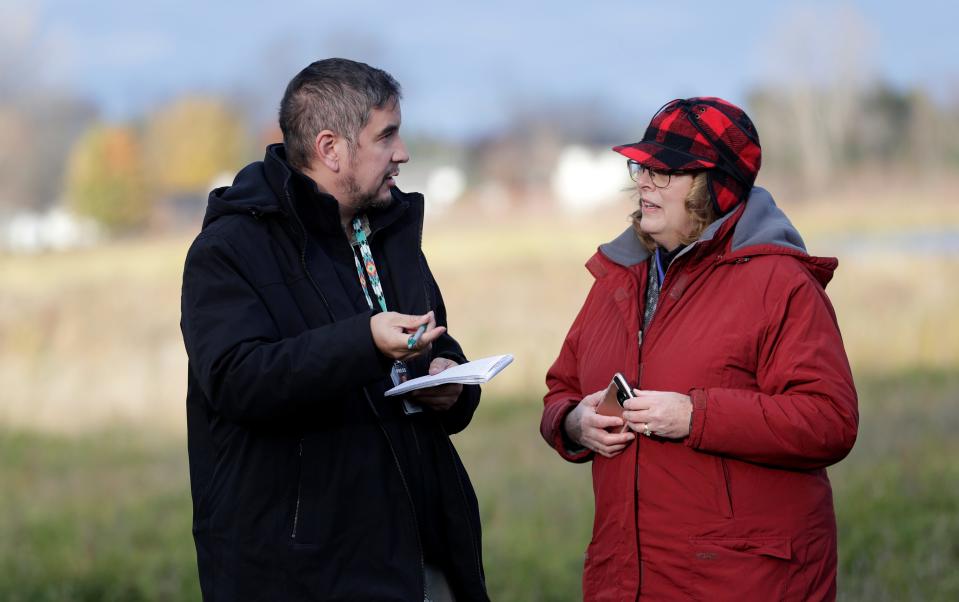
The four new positions bolster our corps members to six with Jessica Rodriguez already covering Latino communities in Milwaukee and Frank Vaisvilas on the Indigenous Native American beat in Wisconsin.
Collaborating to strengthen local journalism in Northeast Wisconsin
The Post-Crescent and Press-Gazette are part of a groundbreaking local journalism collaboration, the NEW (Northeast Wisconsin) News Lab, which was launched in 2021 to strengthen coverage of critical community issues. The collaboration includes FoxValley365, The Press Times, Wisconsin Public Radio and Wisconsin Watch.
The news partners work in coordination with the Community Foundation for the Fox Valley Region, the Greater Green Bay Community Foundation and an educational partner, the University of Wisconsin-Green Bay. Financial support has been provided by Microsoft, the Greater Green Bay Community Foundation, Community Foundation for the Fox Valley Region and the David L. and Rita E. Nelson Family Fund.
The News Lab’s mission is to “Collaborate to identify and fill information gaps to help residents explore ways to improve their communities and lives — and strengthen democracy.”
The lab partners are advancing in-depth local reporting on topics including racism as a public health crisis, causes and solutions of homelessness and the growing diversity in Northeast Wisconsin. Early results of this experiment are extraordinary. All six newsrooms have been able to add journalists — and expand their capacity — as a result of increased funding. In 2021, NEW News Lab stories reached print and online audiences estimated at more than 6.6 million people in 12 states. Stories produced by the partners were picked up by at least 122 news outlets — 70 of them in Wisconsin. Last year’s funding helped us add depth to reporting on affordable housing and the tight labor market.
Civil discussions brought about by Wisconsin Main Street Agenda
This midterm election project began by asking voters, “What you want candidates to talk about as they compete for your vote this fall?” More than 2,323 people took the survey asking voters to list their top issues as part of a partnership with Wisconsin Public Radio and the La Follette School of Public Affairs at UW-Madison.
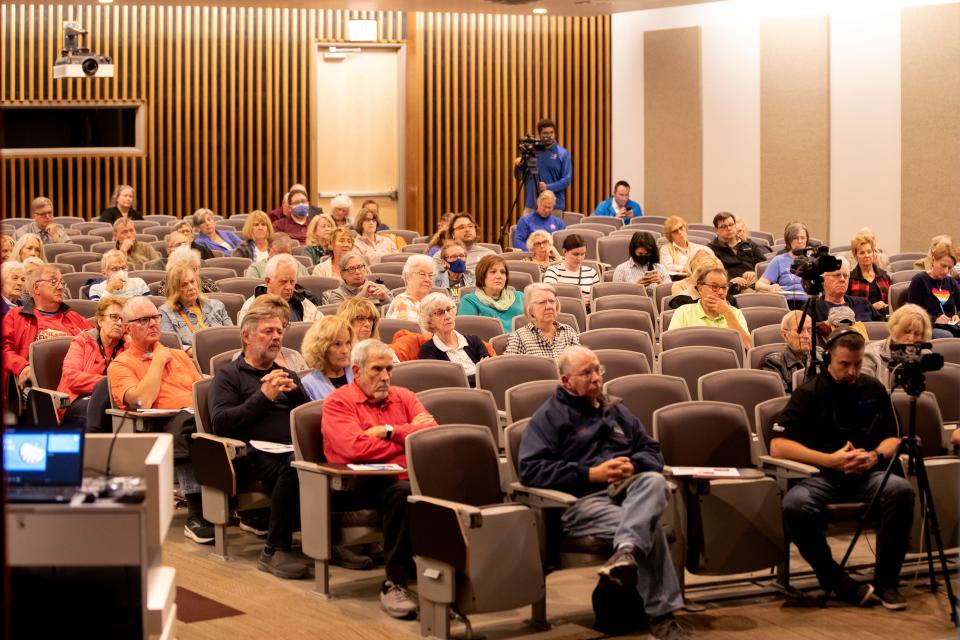
The effort included more than a dozen stories on WPR and USA TODAY NETWORK-Wisconsin newspapers as well as five town hall meetings held across the state attended by more than 400 people and viewed on live video and recordings about 5,700 times. LaFollette experts did short presentations about the public policy behind the issues and took questions from the audience at the town halls. Small groups of voters who took the survey also took to the stage at the events and engaged in a civil and informed group discussion about the issues they cared most about in the election.
Stock the Shelves campaign raises enough for nearly 730,000 meals
Each year, the USA TODAY NETWORK-Wisconsin spends October raising awareness of food insecurity through a partnership with Feeding America Eastern Wisconsin and Greater Fox Cities Chapter of Credit Unions. This year, the campaign collected just over $182,400 to fight hunger in Wisconsin.
Thanks to the purchasing power of Feeding America, where every $1 donated buys about $10 worth of food, this translates to more than 729,600 meals for friends and neighbors in need.

Reporters collaborated on weekly coverage during October, turning the spotlight on the volunteers, program organizers and helpers behind the scenes, working to keep Wisconsin's network of food pantries stocked and ready for clients in need. They also looked at the mental and physical side-effects of persistent hunger and the squeeze put on volunteers by rising inflation costs, to offer a compelling argument for why readers should participate in the campaign.
Read about the campaign:Reader donations to fight hunger in Wisconsin a reminder that the ties that bind us are resilient, and constantly renewed
A Community Thrives sends grants to six Wisconsin nonprofits
Six Wisconsin nonprofits received a combined $235,000 worth of grants through A Community Thrives, an annual grantmaking and crowdfunding program from the USA TODAY NETWORK and the Gannett Foundation.
More than 60 Wisconsin nonprofits entered the program this year and over 700 nonprofits participated nationwide. There were 16 national project grants nationwide: three $100,000 grants; seven $50,000 grants; and six $25,000 grants.
The Wisconsin recipients include:
House of Hope in Green Bay helps young parents and children experiencing homelessness. The nonprofit received the largest possible grant, of $100,000.
Prism's Upstart Kitchen and Brigade MKE in Milwaukee received $50,000. Prism, a Milwaukee-based charity working to foster sustained economic growth for the Sherman Park Community, plans to expand its UpStart Kitchen and Brigade MKE programs.
Fox Valley Memory Project in Menasha received $35,000. It plans to expand its programs for the aging, patients with Alzheimer’s and their caregivers. The organization serves Menasha and the surrounding communities.
MacCannon Brown Homeless Sanctuary in Milwaukee, a one-stop-shop for residents who need everything from a brown bag lunch to living room furniture, got $25,000. Sister MacCanon Brown and volunteers serve hundreds of people every week.
Milwaukee's Bridge Builders in Milwaukee received $15,000. This Milwaukee nonprofit runs programs that assist with home repairs in Milwaukee, and helps people become homeowners.
Milwaukee Youth Symphony Orchestra's community programs provide diverse musical education to Milwaukee youths who would otherwise have no access. It received $10,000.
Liz Krumwiede, community engagement coordinator at House of Hope, said that the Gannett Foundation grant "put us over the edge of making the drop-in center possible."
"The money makes it sustainable, too," she said. "We are going to be able to hire new staff specifically for the drop-in center. We'll be able to get video games so kids can feel like kids again. We're getting new furniture. That money is making it possible for us to have this space, possible for us to staff it and to make it comfortable and cozy."
To be part of the program, local nonprofits submit their community improvement ideas for a chance at grants ranging from $2,500 to $100,000. Any 501(c)3 or municipal program was eligible to apply.

Thank you
This report was produced by the journalists of the USA TODAY NETWORK-Central Wisconsin. Special thanks to Taima Kern, Tom Koetting, Sam Roe, Jim Fitzhenry and Greg Borowski for their efforts in producing this report. Thank you to all of our subscribers. Your support of public service journalism helps make our communities better, more equitable and more democratic. If you haven't subscribed yet, please consider doing so.
The USA TODAY NETWORK-Wisconsin newsrooms also rely on tips and suggestions from the public on what we should look in to next. Check our websites for the latest staff lists, to contact us via one of the following methods:
Milwaukee Journal Sentinel — Send your tips to watchdog@journalsentinel.com or Signal at 414-319-9061. You can also submit tips at jsonline.com/tips
Appleton Post-Crescent — email pcnews@postcrescent.com or pcsports@postcrescent.com
Green Bay Press-Gazette — email metro@greenbaypressgazette.com
Oshkosh Northwestern — email oshkoshnews@thenorthwestern.com
Fond du Lac Reporter — email news@fdlreporter.com
Manitowoc Herald Times Reporter — call 920-686-2984 or email htrnews@htrnews.com
Sheboygan Press — call 920-686-2984 or email news@sheboyganpress.com
Wausau Daily Herald — email news@wausaudailyherald.com
Wisconsin Rapids Daily Tribune — email news@wisconsinrapidstribune.com
Stevens Point Journal — email news@stevenspointjournal.com
Marshfield News Herald — email news@marshfieldnewsherald.com
This article originally appeared on Milwaukee Journal Sentinel: USA TODAY NETWORK-Wisconsin staff had impact on communities in 2022

